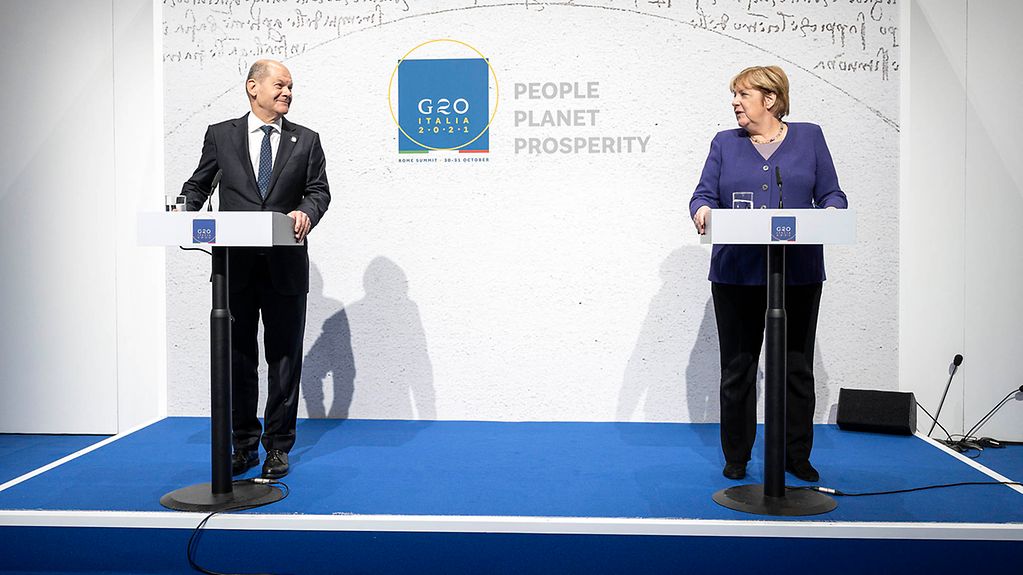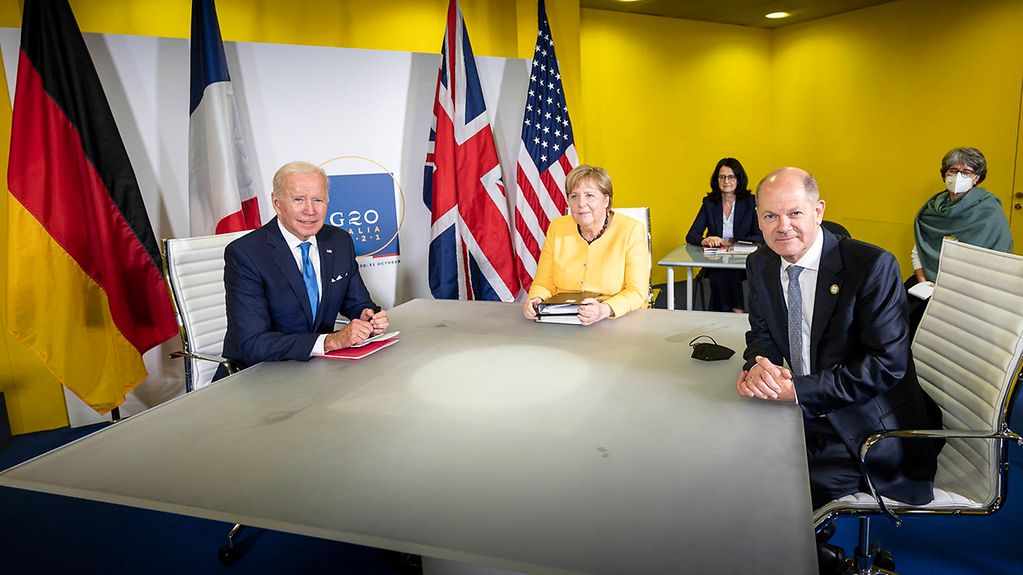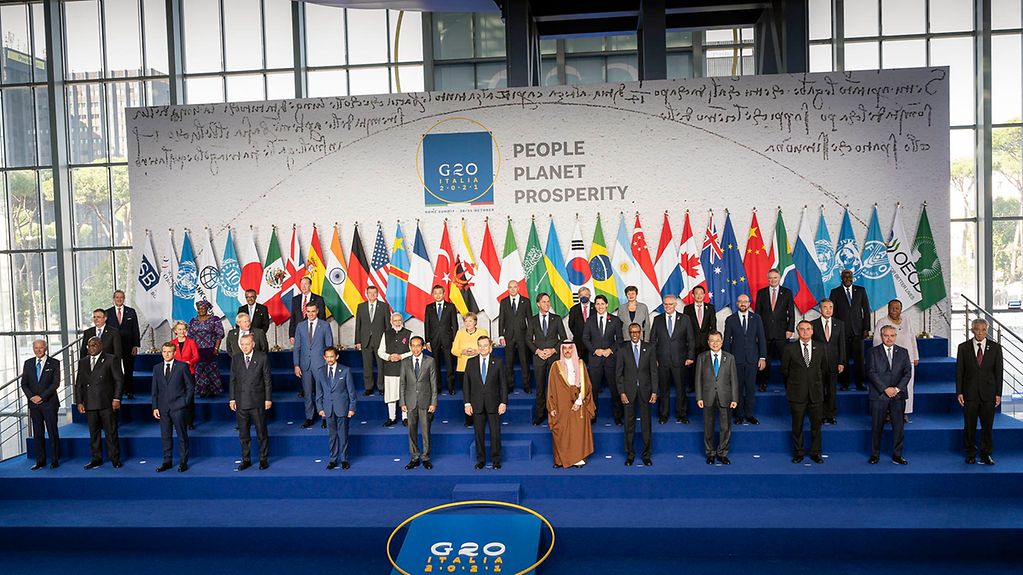G20 Summit in Rome
Climate protection, global health and the world economy were some of the priority topics for the G20 summit in Rome. The heads of state and government reached agreement on a range of issues, including a minimum tax on businesses and targets for global vaccine supply. They also declared their commitment to the Paris Agreement on climate protection. Federal Chancellor Merkel also held bilateral talks.
5 min reading time

Federal Chancellor Merkel and Federal Finance Minister Scholz talk to the media in Rome.
Photo: Bundesregierung/Bergmann
“The summit was held in an excellent atmosphere, a very constructive atmosphere,” the Federal Chancellor said after the end of the G20 summit in Rome, though she also noted that “many issues around the world have gone beyond the point of urgency.” The G20 heads of state and government held two days of talks under the Italian presidency’s motto of “People, Planet, Prosperity”, where the priorities were the world economy and global health, climate change and the environment, and sustainable development. Merkel thanked the Italian government for its “marvellous preparations” for the summit.
The Leaders’ Declaration from the G20 Summit in Rome can be downloaded here PDF, 355 KB, not barrier-free .
Reacting “much more decisively” to climate change
Climate change was among the items on the agenda for the second day of the summit. Merkel stressed that climate change and the loss of biodiversity represented a “problem of the utmost urgency,” and that we must respond “much more decisively than has been the case until now.”
According to the Federal Chancellor, the G20 talks had achieved “good results and sent out a good signal for Glasgow,” calling to mind the fact that G20 states are responsible for around 75 percent of global CO2 emissions. For the first time since 2016, the G20 leaders recommitted themselves to the Paris Agreement, which has also now been ratified by all G20 states. “This is excellent news,” according to Merkel, who praised the G20 states’ commitment to the 2-degree target and to keeping the 1.5-degree target within reach.
Phasing out international investment in coal
According to the Federal Chancellor, the commitment to phasing out international investment in coal is “no less important” than the commitment to climate goals. In Merkel’s view, China has taken a “significant step” in this regard, which all others have followed, a development which will now make “the transformation to other energy sources happen much more quickly.”
Natural gas will have a crucial role to play in this transformation. On this point, Merkel stressed the importance of delivering sensible investment in Africa, particularly in the field of natural gas. She also noted that the credibility of these measures is underlined by the fact that the agreement to provide 100 billion US dollars to developing countries to invest in climate protection will be achieved in 2023. “I believe Germany is making an excellent and very important contribution to this,” Merkel said.
Summit commences with thanks to doctors and nurses
The summit began on Saturday with a “family photo” of the heads of state and government, who were joined in Rome by doctors, nurses and paramedics in what Federal Chancellor Merkel described as “a deeply moving gesture.” However, Merkel also underlined the importance of remembering that the pandemic was not yet over.
“Milestone” minimum tax agreement
The G20 heads of state and government discussed global economic issues on the first day of the summit, during which they agreed a minimum tax on businesses. The Federal Chancellor stressed that this agreement represented “a milestone in global collaborations” and “a clear signal of justice in times of digitalisation.” Merkel also expressed her hope that similar success could be achieved in reforming the World Trade Organisation (WTO). The Federal Chancellor drew attention to “the delicate interaction of a range of factors in the world economy” as the world economy recovers after the pandemic, citing energy prices and disruptions to some supply chains as examples.
Distributing vaccines “swiftly and fairly”
Also on the first day, the G20 leaders discussed health, focusing on global efforts to fight the pandemic. The Federal Chancellor recalled how Germany had put health on the agenda of the G20 at its 2017 summit, which took place against the background of the Ebola epidemic. That summit also included the first ever meeting of health ministers. This formed the foundation for later efforts, such as the G20’s COVAX initiative to distribute vaccines.
The G20 aim to ensure that 40 percent of the world’s population have been vaccinated by the end of the year, rising to 70 percent by mid-2022. Merkel described this goal as a “vital element in a fair fight against the pandemic.” Germany is supporting the plan by sharing 175 million vaccine doses. “These vaccines must be distributed swiftly and fairly,” according to the Federal Chancellor.
Global vaccine supply
Merkel stressed the importance of the fact that Senegal and Rwanda have recently signed the first contracts with BioNTech to produce vaccines in Africa, and praised the Federal Government’s support for the plan through the “Compact with Africa“.
The Vaccine Manufacturing Working Group, an international working group co-chaired by Germany and South Africa, is finding ways to boost global vaccine production. It presented a report to the G20 on supporting the COVAX initiative which included major core recommendations. (Further information can be found here.) “This report is also mentioned in the communiqué from the G20 summit,” according to Merkel, who noted the working group’s aims of strengthening the World Health Organisation and creating a basis that would allow the world to “be better prepared” for future pandemics.
Bilateral talks
Alongside the summit, the Federal Chancellor held bilateral talks which included meetings with President Biden of the USA, Prime Minister Modi of India, South Korean President Moon, President Fernàndez of Argentina, President Erdoğan of Turkey and Prime Minister Lee of Singapore. The Federal Chancellor was joined in the bilateral talks by the Federal Finance Minister, Olaf Scholz. The talks covered global issues as well as questions of bilateral cooperation.

In a G20 summit fringe meeting, Federal Chancellor Merkel and Federal Finance Minister held bilateral talks with US President Biden.
Photo: Bundesregierung/Bergmann
Joint declaration on Iranian nuclear programme
In another meeting on the summit fringe, Federal Chancellor Merkel met President Biden of the USA, President Macron of France and Prime Minister Johnson of the United Kingdom to discuss Iran’s nuclear programme. The leaders agreed a joint declaration. Merkel stressed that they were counting on Iran returning to the negotiating table. “However, time is passing and enrichment activities in Iran are continuing,” Merkel observed. “This is deeply troubling for us.” Merkel said it was time to talk about “what can be done to ensure that Iran does not arm itself with nuclear weapons.”
Find out more about the G20 summit in our questions and answers.

The participants at the G20 summit met for a family photo before the first session.
Photo: Bundesregierung/Bergmann